Award-Winning Chicago Personal Injury Lawyer - Securing Justice
for Illinois Injury Victims - Over $450 Million Recovered
If you or a loved one has experienced a brain injury, a knowledgeable Chicago brain injury lawyer at Rosenfeld Injury Lawyers is here to help. These injuries can change lives in an instant—physically, emotionally, and financially.
Contact us today to schedule a free consultation and learn how we can help you recover compensation for your medical bills, lost income, and long-term care.

A brain injury generally refers to any disruption or damage to the normal function of the brain, often caused by an external force, lack of oxygen, or bleeding inside or around the brain.
It ranges in severity from mild concussions that may result in temporary symptoms to extremely serious incidents leading to lasting impairments.
Traumatic brain injuries (TBIs) are a serious health concern across the United States. Here’s an overview of some startling statistics:
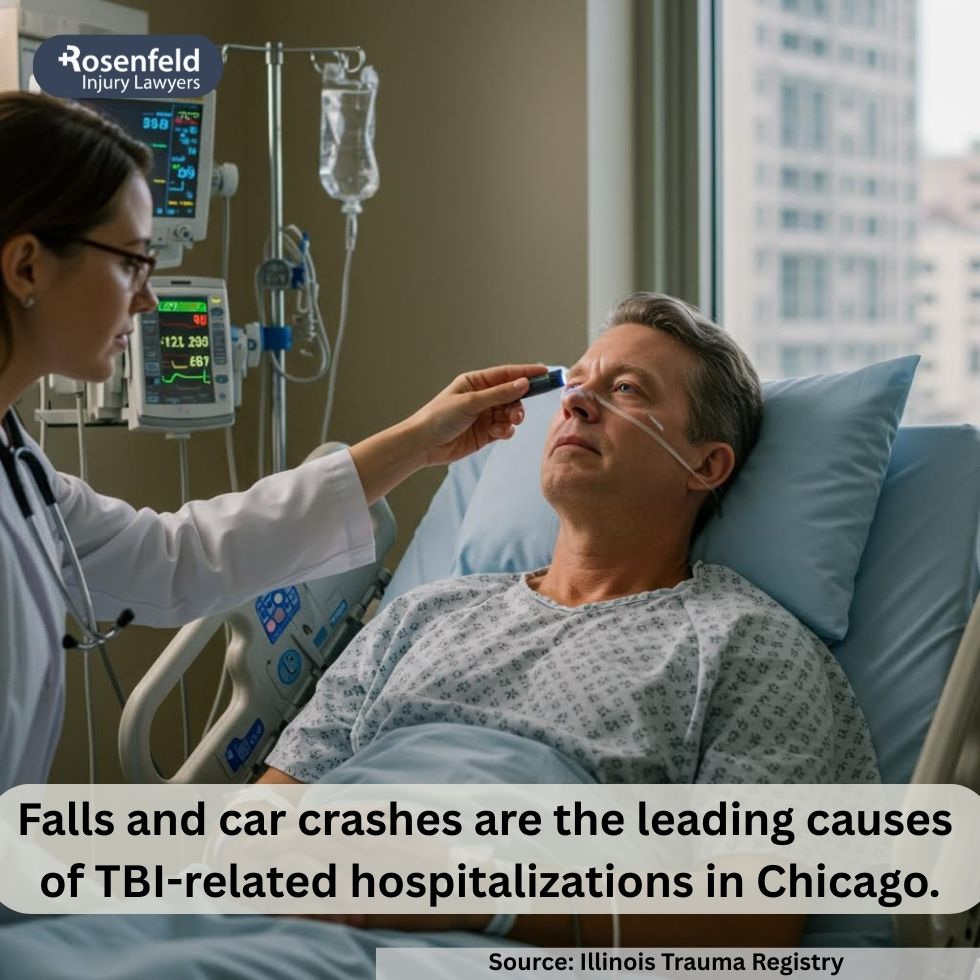
Brain injuries can manifest in various forms, each with unique causes and levels of severity. Some of the most common types include the following:
Concussions are one of the most common types of traumatic brain injury (TBI) and typically result from a sudden impact on the head or movement that causes the brain to shake within the skull. This may lead to mild TBI symptoms like headaches, dizziness, and confusion, or more severe symptoms, depending on the severity.
A stroke occurs when blood flow to part of the brain is blocked or a blood vessel within the brain ruptures, potentially causing damage to affected areas. Symptoms can range from weakness and speech difficulties to paralysis.
Strokes require timely and accurate diagnosis to be treated effectively, as a misdiagnosis or delay in treatment can lead to irreversible damage. If you or someone you know has a stroke due to a possible medical malpractice, you can consult a Chicago stroke misdiagnosis attorney to understand whether you have a case.
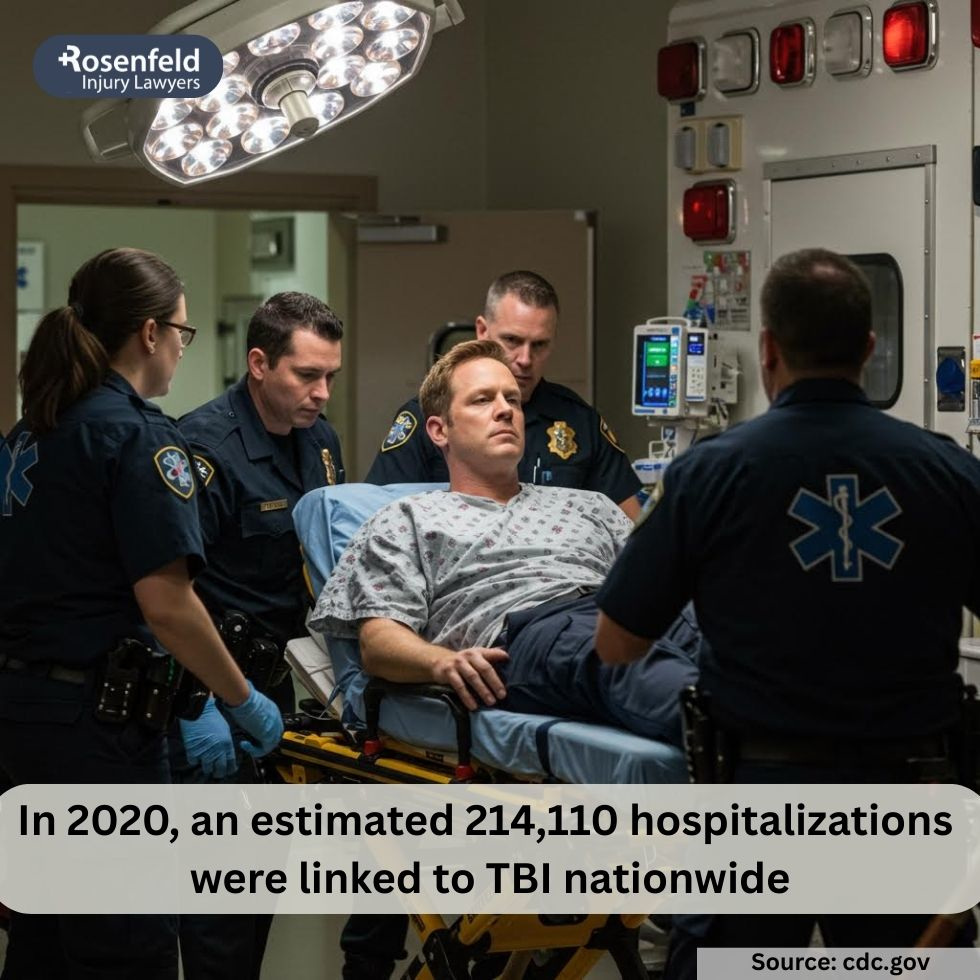
An aneurysm in the brain refers to a bulging, weakened area of a blood vessel, making it prone to rupture and bleed into the surrounding areas. This can create significant pressure within the skull and produce severe headaches, and vision problems, or lead to life-threatening complications if untreated to relieve pressure.
A hemorrhage involves uncontrolled bleeding either within or around brain tissue, which often physically damages brain cells. It might be caused by trauma or ruptured aneurysms, leading to symptoms such as sudden and severe headaches, vomiting, and loss of consciousness. These injuries can be life-threatening.
A skull fracture occurs when there is a break in the cranial bone caused by impact to the head, sometimes a penetrating brain injury.
Depending on its severity, it can range from a simple crack to penetration of brain tissue and may lead to serious complications in a person’s life, such as infections and permanent disability, as well as psychological suffering and other emotional symptoms.
If you or a loved one has suffered from a skull fracture due to someone else’s negligence and needs legal assistance with personal injury claims, you can reach out to a Chicago fracture injury lawyer to receive fair compensation.
Instances of complete oxygen deprivation can result in severe and permanent brain damage or even death, whereas partial deprivation may cause varying degrees of normal brain function impairment depending on the duration and extent to which the brain was deprived.
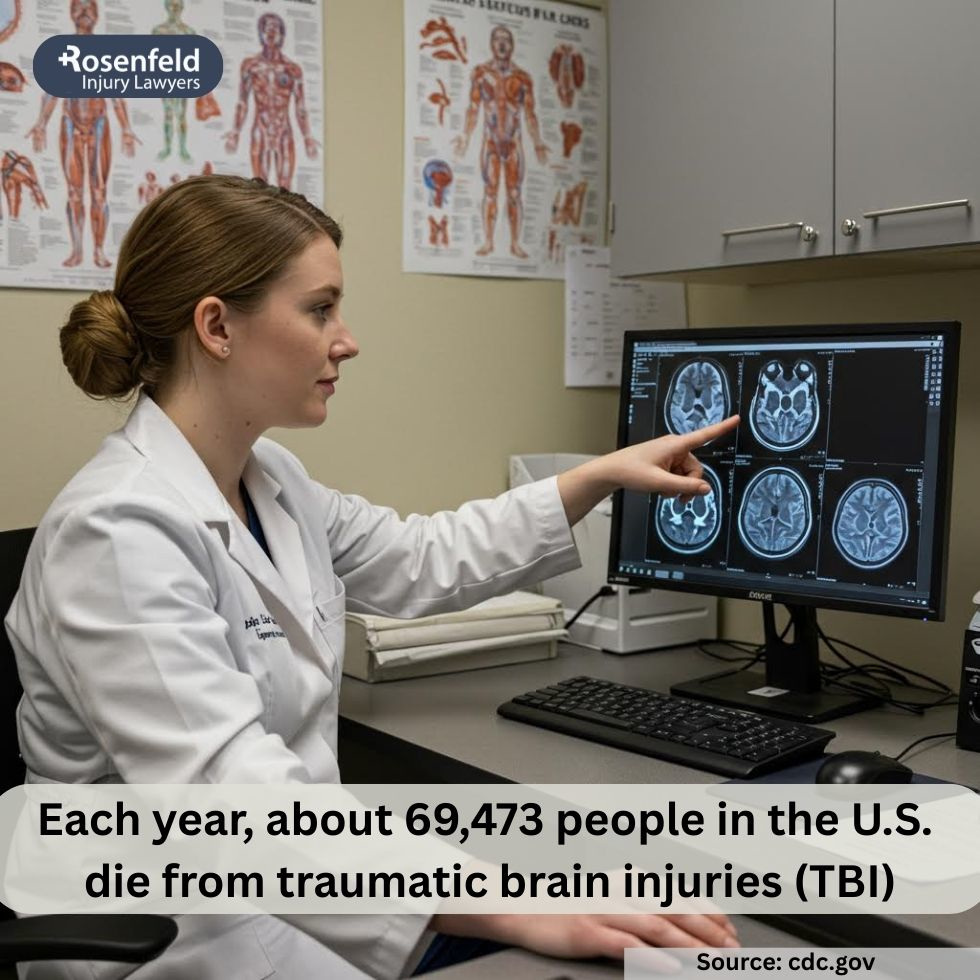
Head injuries and traumatic brain injuries occur in a multitude of circumstances. However, some scenarios are more common than others. Assessing the cause is essential for determining liability and pursuing appropriate legal action. Below are some of the most common causes of brain injury cases in Chicago.
Collisions involving trucks and cars rank high among causes for brain injuries due to the forceful impacts that can jostle or cause a person’s head to strike an object, potentially leading to traumatic brain injury, like diffuse axonal injury, caused by rapid shaking back and forth.
Collisions on major roads like Lake Shore Drive, I-290, or Western Avenue often result in sudden head impacts, which can cause severe traumatic brain injury, such as diffuse axonal injury. Our Chicago car accident attorneys are well-versed in handling TBI cases and can ensure that the at-fault party is held accountable.
A slip-and-fall on an icy sidewalk in Wicker Park or a wet floor in a Magnificent Mile retail store can result in brain injuries when someone hits their head. Falls often result in hospitalizations or even permanent disabilities.
If you’ve suffered a brain injury after slipping and falling on another’s property, contact our Chicago slip and fall injury lawyers to ensure maximum compensation through a premises liability claim.
Acquired brain injury can also result from dangerous or faulty products, like defective bicycle helmets or malfunctioning industrial equipment. If a product fails to prevent or causes a penetrating injury, the manufacturer may be held liable.
If you believe your brain injury was the result of a defective product, contact our Chicago product liability attorneys to discuss the compensation you may be entitled to.
Mistakes in medical attention settings can lead to some of the most adverse outcomes, including serious injuries caused by oxygen deprivation, surgical mistakes, or birth injuries.
If you believe your brain injury stems from a medical mistake or negligence, don’t wait to seek justice. Our team of Chicago medical negligence attorneys has the following specialists to help you receive the compensation you deserve:
If you think that either you or someone close to you might have sustained a brain injury—whether it’s mild, moderate, or severe TBI—it’s critical to take prompt and appropriate steps. Here’s what you should consider doing:
Our skilled traumatic brain injury attorney aims to help you receive fair compensation for all damages sustained, including but not limited to:
In a successful brain injury claim, there’s no average or go-to amount when it comes to settlement figures. The value of a traumatic brain injury case depends on individual factors, like:
Insurance company policy limits play a crucial role in the amount that can be claimed, as the defendant’s coverage will cap how much you could potentially receive through a settlement, regardless of your actual damages.
To obtain full and fair compensation in these circumstances, you would need to file a traumatic brain injury lawsuit against the defendant. An experienced attorney is vital in seeking fair compensation for traumatic brain injury claims.
The scope of treatment for brain injuries varies widely, ranging from rest and careful monitoring in cases of mild traumatic brain injuries to extensive, long-term rehabilitative care for severe trauma.
Costs can escalate rapidly when more intensive interventions–surgeries, therapies (both for the physical trauma and cognitive consequences), and medications–are necessary.
The lifetime costs of treatment for traumatic brain injury are substantial and are estimated to range from $85,000 to $3 million, depending on the severity and specific needs of the individual patient.
With such astronomical potential expenses, it becomes imperative that victims speak with a traumatic brain injury attorney as soon as possible if someone else is to blame for their injury.
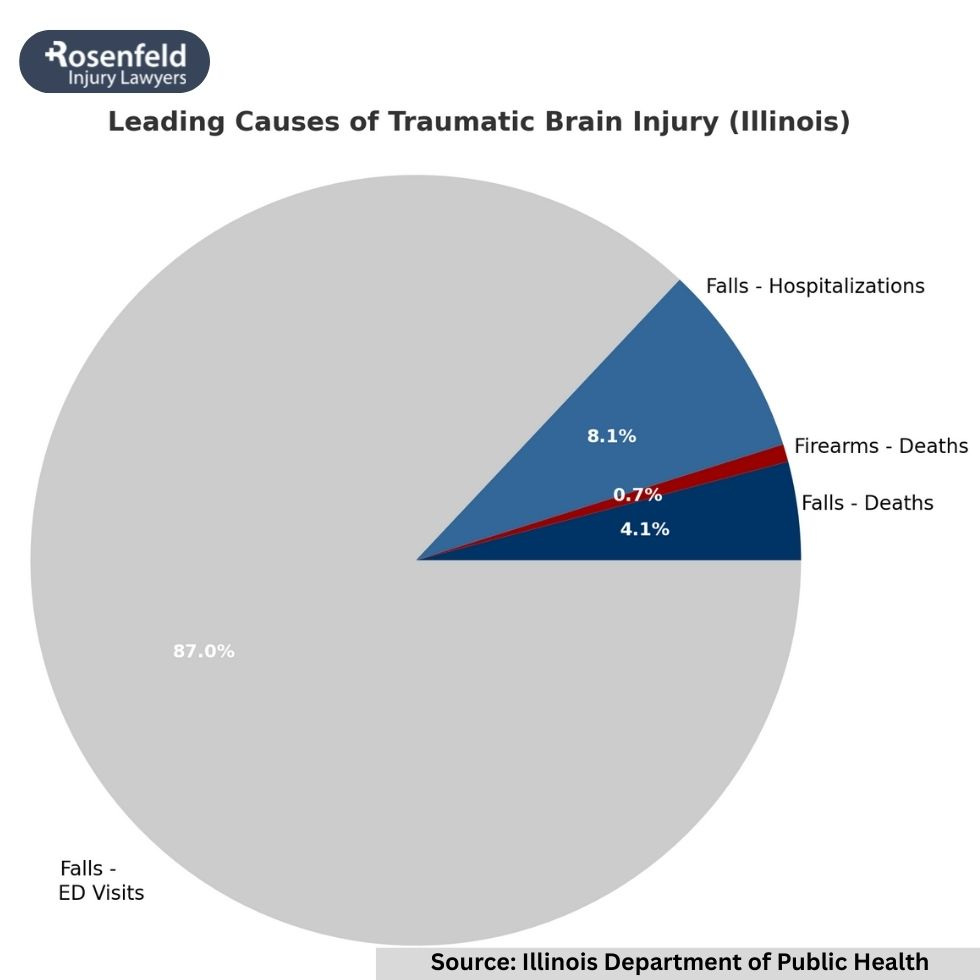
In a brain injury claim, identifying all responsible parties is critical for ensuring maximum compensation. Here are some potentially liable parties:
A person who causes a traumatic brain injury through negligent actions, such as reckless driving, can be held liable under 735 ILCS 5/2-1116, Illinois’ comparative fault statute. These claims often arise from car accidents or physical assaults.
Under the doctrine of vicarious liability and the Illinois Workers’ Compensation Act (820 ILCS 305/), employers may be responsible when a TBI occurs during work activities due to unsafe conditions, lack of training, or defective equipment.
A company that produces or sells a defective item can be held liable under 735 ILCS 5/13-213. This includes cases involving unsafe machinery, helmets, or tools that lead to head injuries or brain damage.
Property owners may be held accountable under the Illinois Premises Liability Act (740 ILCS 130/) if the brain injury resulted from hazards like broken stairs or unshoveled ice that they failed to correct.
Medical malpractice claims for traumatic brain injury (TBI) are governed by 735 ILCS 5/2-622, which outlines requirements for suing healthcare providers over surgical errors, delayed diagnoses, or birth trauma that impact brain function.
Claims against public agencies must follow the Illinois Court of Claims Act (705 ILCS 505/). These can involve failure to maintain sidewalks, remove roadway hazards, or properly train city employees, leading to serious head trauma on public property.
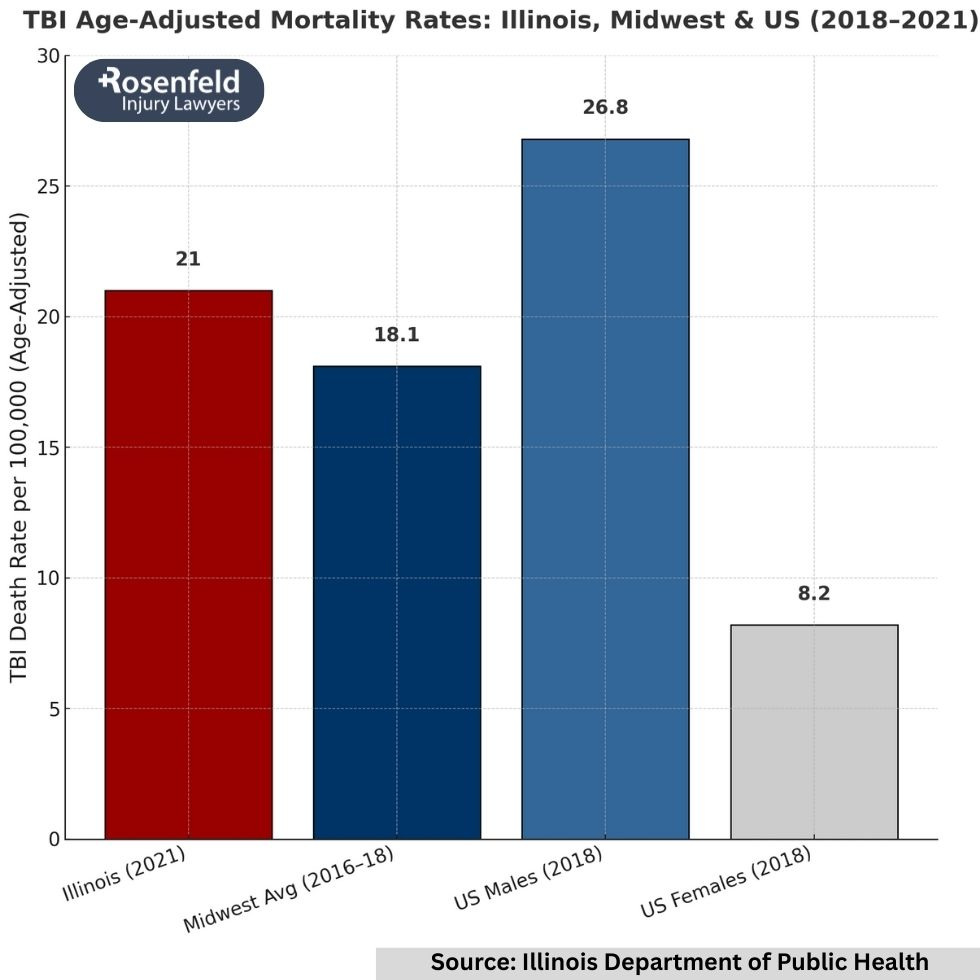
Proving liability in brain injury cases usually revolves around establishing that the other party was negligent. To do this, the following four elements must be proven:
The experienced Chicago personal injury attorneys from Rosenfeld Injury Lawyers can help TBI victims gather evidence, use expert testimony, and present a persuasive argument to insurance companies or in court.
In Illinois, the statute of limitations for filing a brain injury lawsuit is usually two years from the date that your injuries were sustained (735 ILCS 5/13-202). However, exceptions to this rule often arise.
For example, if you were a minor when injured, you have a longer deadline, and if you were injured through medical malpractice, the timeline is different as well.
For these reasons, you should always speak with a lawyer as soon as possible after an injury to ensure you don’t miss out on your chance for compensation.
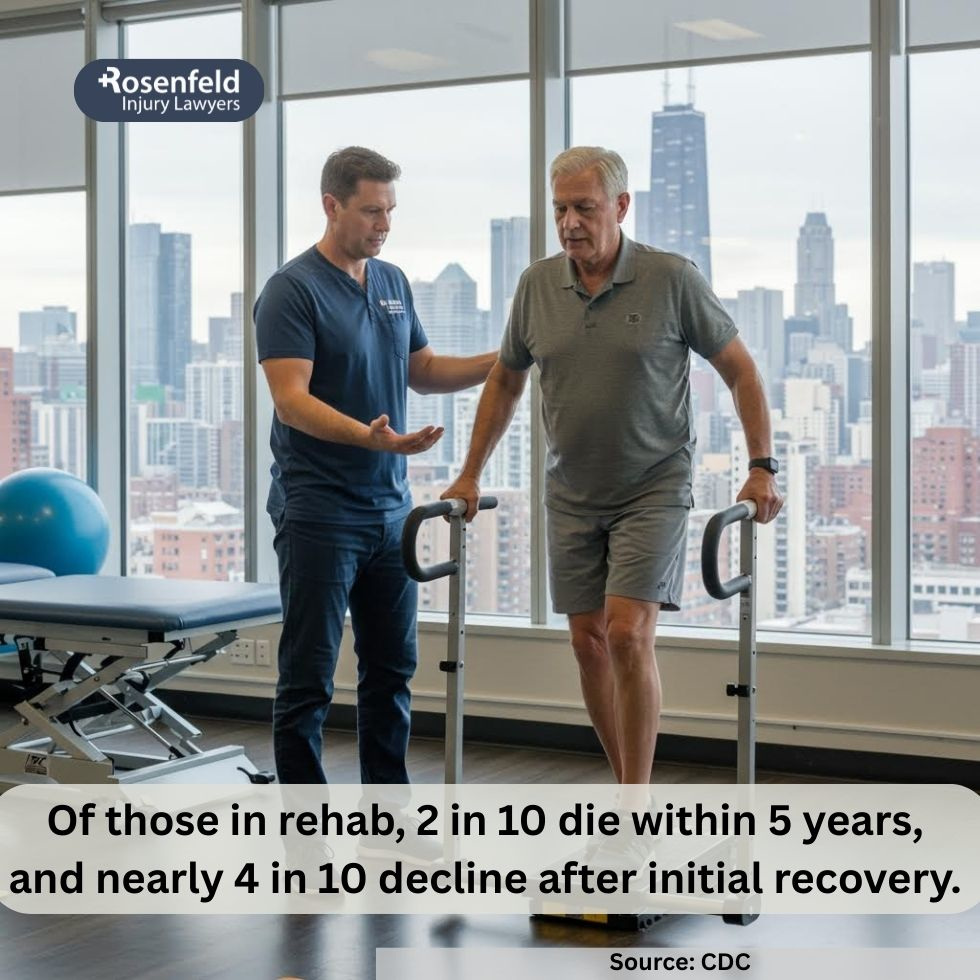
Our Chicago brain injury attorneys are equipped with the necessary experience and resources to build strong personal injury cases on your behalf. Here’s how we can help:

Confronting a brain injury can be overwhelming, but you don’t have to face it alone. The compassionate and skilled personal injury law firm at Rosenfeld Injury Lawyers is ready to assist you every step of your journey so you can focus on what really matters—your health and recovery.
We’ll determine who is liable and pursue compensation on your behalf, sometimes including filing claims against multiple parties.
Call our legal team at (888) 424-5757 or reach out online today to speak with a Chicago brain injury lawyer.
Our downtown office, near the Richard J. Daley Center, Dirkson United States Courthouse, and the Chicago Workers’ Compensation Commission, offers convenient access from Aurora, Joliet, and Waukegan via I-90, I-94, and I-290.
225 W Wacker Dr #1660
Chicago, IL 60606
Phone: (847) 835-8895
Toll Free: (888) 424-5757
We also serve clients from Buffalo Grove, Decatur, Peoria, Springfield and throughout Illinois.
Resources: [1] NIH, [2] DPH, [3] DPH, [4] Northwestern
All content undergoes thorough legal review by experienced attorneys, including Jonathan Rosenfeld. With 25 years of experience in personal injury law and over 100 years of combined legal expertise within our team, we ensure that every article is legally accurate, compliant, and reflects current legal standards.